Search the Special Collections and Archives Portal
Search Results

Patricia Vazquez interview, November 14, 2018, June 14, 2019: transcript
Date
Archival Collection
Description
Session 1: Interviewed by Marcela Rodriguez-Campo. Barbara Tabach also participates in the questioning. Session 2: Interviewed by Rodrigo Vazquez. Monserrath Hernandez also participates in the questioning. Patricia Vazquez was born and raised in Las Vegas, NV and shares her experiences growing up in the Valley as a Queer Latina. At a young age, she remembers traveling back and forth between Mexico and the U.S. to visit family. When she started school she shares how her home language, Spanish, became her family's "secret language" as she began to learn English. During elementary school Patricia was tracked into the special education program, and remove from the mainstream classroom. She would find her love for learning in books and libraries as she taught herself how to read in English. Despite being tracked into less advanced courses, Patricia would end up taking AP/ Honors courses in high school after forging her favorite teachers signature, which changed her educational trajectory. After coming out to her family, Patricia went nearly a decade distanced from her mother and continued her college education at Arizona State University. There, she would complete a bachelors in painting and a masters in comparative literature. Her work with the Chicano Studies program at ASU helped her develop her Chicana identity and begin her involvement in social activism. In Las Vegas, she worked to fight for marriage equality and LGBTQ rights with the American Civil Liberties Union , and later with the Progressive Leadership Alliance of Nevada. She also conducted several lectures for the Latino Youth Leadership Conference on sexuality, gender, and homophobia for over a decade. She has served as an English Professor at the College of Southern Nevada for the last 20 years and is an avid hiker, traveler, and painter.
Text
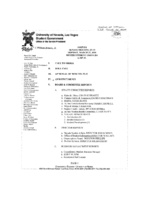
Meeting minutes for Consolidated Student Senate University of Nevada, Las Vegas, March 27, 1995
Date
Archival Collection
Description
Text

Alan Stock oral history interview: transcript
Date
Archival Collection
Description
Oral history interview with Alan Stock conducted by Barbara Tabach on December 27, 2017 for the Remembering 1 October Oral History Project. In this interview, Alan Stock discusses moving to Las Vegas, Nevada in 1999 for his job as a radio talk show host for KXNT. Stock describes the broadcast that covered the October 1, 2017 Las Vegas mass shooting from 11 PM on that night until 9 AM the next morning. He talks about some of the calls the station received from various members of the community, including survivors of the shooting, families of those at the event, people on lockdown in the nearby hotels, doctors, and general listeners. Stock describes some of the topics discussed on the broadcast, such as what was currently happening on the Las Vegas Strip, stories of the aftermath, and the support needed from the general public. Other topics include gun control and conspiracy theories. He discusses the impact this and other shootings would have on public affairs, including tighter security in daily living and public gatherings. He compares security in the United States to security in Israel and other countries, focusing on the idea of unconcealed guns worn in public. Throughout this interview, Alan Stock explains that the radio station's goal was to provide accurate information to the public during the aftermath of the October 1, 2017 mass shooting.
Text
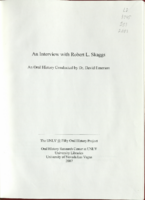
Transcript of interview with Robert L. Skaggs by Dr. David Emerson, May 06, 2006
Date
Archival Collection
Description
Text
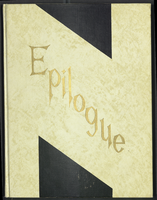
Epilogue: Nevada Southern University Yearbook, 1959
Date
Description
Yearbook main highlights: schools and departments; detailed lists with names and headshots of faculty, administration and students; variety of photos from activities, festivals, campus life, and buildings; campus organizations such as sororities, fraternities and councils; beauty contest winners; college sports and featured athletes; and printed advertisements of local businesses; Institution name: Nevada Southern University, Las Vegas, NV
Mixed Content
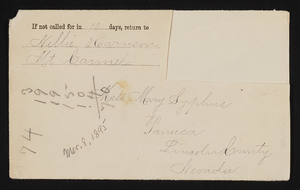
Letter and envelope from Nellie Harrison, Mt. Carmel to Mary Etta Syphus, Panaca, Nevada
Date
Archival Collection
Description
From the Syphus-Bunker Papers (MS-00169). The folder contains an original handwritten letter, a typed transcription of the same letter, the original envelope with the stamp removed, and a copy of the original letter.
Text
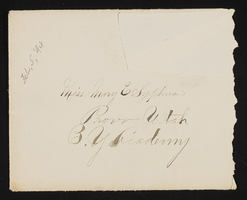
Letter and envelope from John M. Bunker, Logan, Utah. to Mary Etta Syphus, Provo, Utah
Date
Archival Collection
Description
From the Syphus-Bunker Papers (MS-00169). The folder contains an original handwritten letter, a typed transcription of the same letter, the original envelope with the stamp removed, and a copy of the original letter.
Text

University of Nevada, Las Vegas law school establishment: correspondence, newspaper clippings, and reports
Date
Archival Collection
Description
Folder from the Jean Ford Papers (MS-00025) -- Political materials file.
Text
Gary W. Royer Collection on Gaming
Identifier
Abstract
The Gary W. Royer Collection on Gaming (dating from 1950 to 2009, with the bulk of the materials dating from 1970 to 1995) contains research files, legal files, reports, and manuals about gaming written and collected by Gary W. Royer. The collection includes research and regulatory files collected by Royer while he worked at the Nevada Gaming Control Board. These files primarily document the legislation and regulation of gaming in Nevada, but include information on other states in the US and some international locations. Regulatory files include statutes, codes, regulations, revenue reports, Nevada Gaming Control Board and Nevada Gaming Commission meeting minutes, and tribal-state gaming compacts. Also included are research files about casino, racetrack, and sports betting facilities that include data on organizations, monthly revenue reports, occupancy rates, management and operational control manuals, annual reports, policy and procedure manuals, and profile sheets collected for consulting purposes in Royer’s role as President of Casino Control Corporation (CCC), a private gaming consulting firm. Also included are subject and research files, vendor advertisements, catalogs, and reports; gaming industry publications; conference materials; audit guides; and a comprehensive collection of newspaper articles that document the US gaming industry in the second half of the twentieth century.
Archival Collection
Richard B. Taylor Photograph Collection
Identifier
Abstract
The Richard B. Taylor Photograph Collection (approximately 1957-1991) consists of black-and-white and color photographic prints and negatives. The images depict Taylor alongside Pi Kappa Alpha fraternity brothers playing table games and seated at a bar inside the Arizona Club in Las Vegas, Nevada. Additional images portray Taylor’s home on Trotter Circle in Las Vegas decorated for Halloween.
Archival Collection
